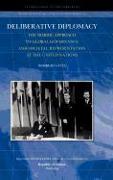Deliberative Diplomacy
BücherAngebote / Angebote:
The ascendency of executive power in the presence of weak parliamentary and societal control has given rise to a need for deliberative forms of diplomacy in international relations. As Denmark, Finland, Iceland, Norway, and Sweden regularly include members of parliament, party representatives, and representatives of civil society in their delegations to the General Assembly of the United Nations, does this imply that a Nordic model exists? This book reviews the practice of these countries and finds that the role of societal representatives has diminished from participating members of delegations to mere observers. The Nordic examples illuminate the difficulties of achieving international governance through the practice of deliberative democracy. Table of Contents List of figures, images, and tables List of abbreviations Preface 1. Introduction The problem Why do the General Assembly and Norden matter? Theory and methodology Prior research 2. Challenges and traditions Delegation and representation at the United Nations Democracy and dilemmas at the UN General Assembly Nordic diplomacy at the League of Nations Unisex state actors and the representation of women 3. Parliament and UN delegations The Scandinavian model: Denmark An anachronism and parliamentarian stronghold: Norway Routine, squeeze-out, routine: Sweden Between Lilliputian and full-scale representation: Iceland Metamorphosis or parliament lost: The Finnish Sonderweg 4. The participation of civil society Scandinavian model revisited: Denmark The return of the body-snatched: Norway Corporatism and double universalism: Sweden Short stories: Finland and Iceland 5. Conclusions: On the way to deliberative diplomacy Archives Bibliography Author Index About the Author(s)/Editor(s) Norbert Götz, Dr. phil. (2001) in Political Science, Humboldt University Berlin, Docent (2007) in Political History, University of Helsinki, habil. (2009) in Modern History and International Relations, University of Greifswald, is Professor at the Institute of Contemporary History, Södertörn University, Sweden. His publications include the edited volume Regional Cooperation and International Organizations: The Nordic Model in Transnational Alignment (Routledge 2009).
Folgt in ca. 15 Arbeitstagen




